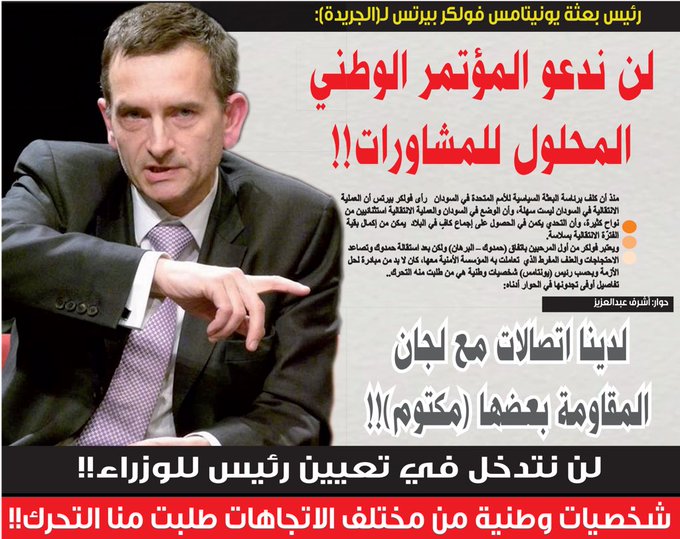Khartoum-Alyurae: The UN envoy and the head of the UNITAMS mission, Volker Perthes, retracted his earlier statement calling on the dissolved National Congress to take part in the UN dialogue between the Sudanese parties to find a solution to the ongoing conflict between the coup d’état and the components of the revolution, whose statement angered a large segment of the Sudanese people, which considered a “provocation to the Uprising and the glorious December revolution”, and its martyrs, who sacrificed a lot in overthrowing the former regime and calling for the accountability of its political incubator, namely the National Congress, the People’s Congress, and many Islamic leaders. Calculated upon the former regime and which shared the power to the moment of its fall.
“They are forbidden from political participation, we respect the laws of the state, and we will not invite them to consultations, and there are independent Islamic figures,” Volker said in an interview with the Al-Jareeda newspaper editor published Sunday.
He explained in the interview with the Newspaper that his mission “will contact all parties even the security”, saying: “All the actors in politics in Sudan, whether they are political parties or civil society forces, or youth such as the resistance committees, or the security establishment, “there are observations on them but I am not talking about General this or that (Flan or Allan) but with the institution, also there are movements signed and not signed by the Juba Agreement: “
The United Nations has supported the Volker -led mission’s call for dialogue, but the Sudanese blame Volker for blessing the coup leadership agreement with the former prime minister, which sparked widespread controversy as the coup d’état had detained the prime minister at the time and dissolved his government, sparking protests that continue.
“There are contacts with them, some of which are muffled,” he said in regard to if he established contact with the resistances committee.
Sudan has been in a state of complete boiling since the overthrow and dissolution of the transitional government headed by Abdullah Hamdok by the head of the Sovereign Council, Abdel Fattah Al-Burhan, and the abolition of key constitutional articles in the partnership’s document between civilians and military personnel in the administration of the country in the transitional period.
*Correction :Article updated to correct Mr. Volker Perthes name


